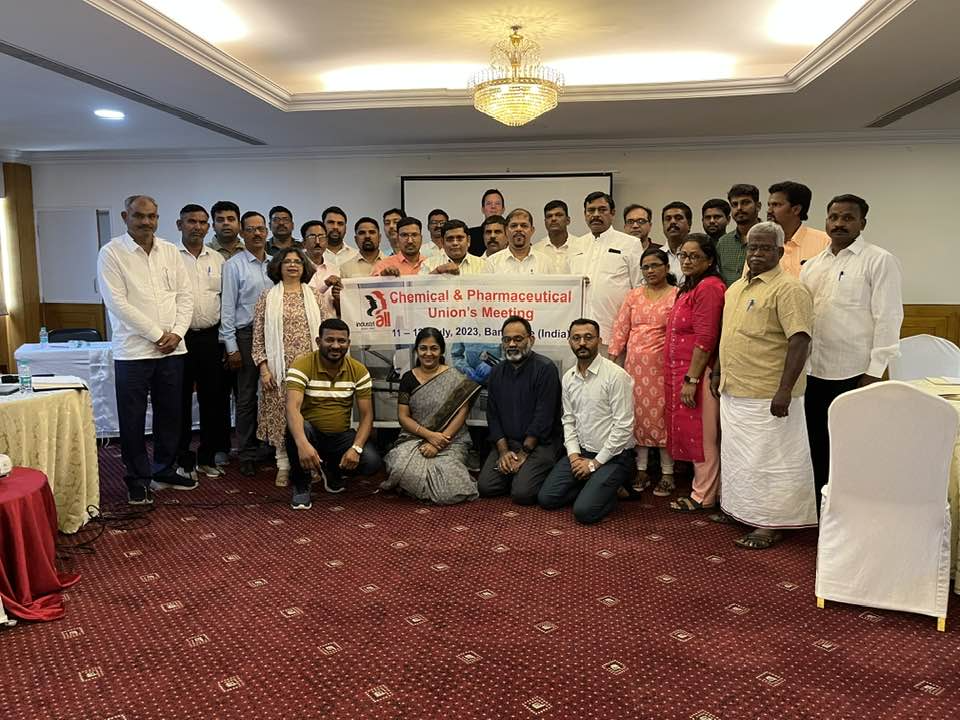19 July, 2023Organising precarious workers, strengthening networks, demanding equal pay for equal work, and workplace health and safety emerged as top priorities for Indian affiliates participating in the chemical, pharmaceutical and tyre sectors meeting, held during 11–13 July.
India is expected to see a huge growth in the chemical, pharmaceutical and tyre sectors. Global share of the Indian chemical industry is projected to triple by 2040. Rising domestic consumption is one of the major factors fuelling the growth.
In pharmaceuticals, India currently ranks third in the world in terms of production volume. The country is called pharmacy of the world and accounts for 60 per cent of global vaccine production and 20 per cent of global supply of generics. Likewise, in the tyre sector, India is among the leading manufacturers and the country is expected to double its revenue by 2032.
While these industries are expected to churn out huge revenues, the underlying factors behind the growth need to carefully scrutinised. According to a report published by McKinsey in March 2023, India’s infrastructure costs across construction, material, and machinery, are up to 70 per cent lower than other global chemicals manufacturing hubs. This means the spending on safety infrastructure is also very poor as is reflected in the high number of industrial incidents reported every month. The report's findings reinforce the concerns brought up at the meeting by IndustriALL affiliates.
Meetings were attended by union representatives from Berger Paints, Solvay, BASF, Fresenius, TTK Pharma, Nerolac Kansai, Kores, Foseco, MRF and JK Tire. Rising engagement of contract workers and poverty wages paid to them is a key concern among unions. The low labour cost is one of the drivers behind the country emerging as the hub of chemical manufacturing. In order to attract capital, employers are paying low wages to workers and hiring more contract workers with no job security or social security benefits. Mergers and acquisitions pose significant challenges to unions in organising and retaining membership. Union members shared that outsourcing of unionised jobs and informalisation of economy coupled with automation is also adversely affecting workers and trade unions.
Tom Grinter, IndustriALL’s director of chemical, pharmaceutical and rubber sectors, said :
“While India is growing as a major manufacturing hub of chemical, pharmaceutical as well as tyre, the situation of workers employed in factories is only becoming worse. We need to build stronger networks and greater solidarity to safeguard workers’ rights. Companies’ policies must be challenged to ensure workers get quality unionised jobs with better wages and working conditions.”
Unions in the pharmaceutical sector cited an example of the ways in which the industry is undermining union power by creating divisions among the working class. Employees in pharma and chemical industry, including sales promotion employees, have been redesignated as executives in order to bring them out of the ambit of the trade unions and labour laws.
Unionists called for inclusive unions and the need for greater collaboration among trade unions by establishing company and sectoral networks, especially in Petroleum, Chemical and Petrochemical Investment Regions.
Apoorva Kaiwar, IndustriALL’s South Asia regional secretary said:
“The chemical, pharma and tyre industries are very important industries in India. Building union power in these industries is crucial to make sure that workers’ rights are advanced, even as the industries move towards newer technologies, and the need for Just Transition becomes imperative.”


